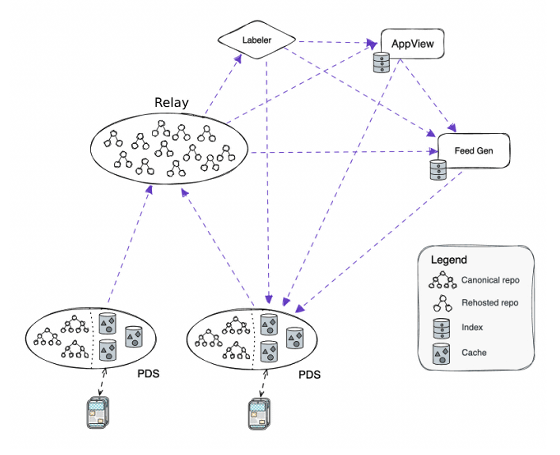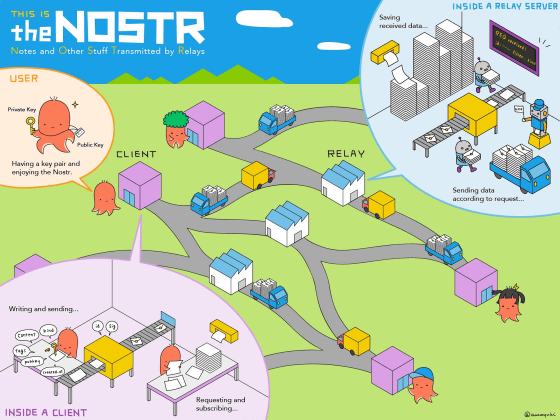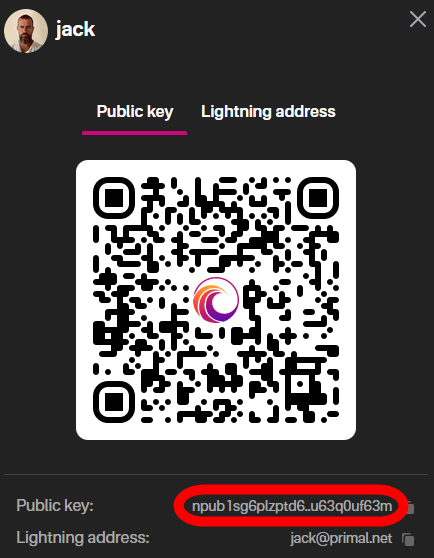What are the differences between the decentralized SNS protocols 'AT Protocol', 'ActivityPub' and 'Nostr'? A summary of their features

Following the specification change of X (formerly Twitter), attention has been drawn to decentralized SNS such as Bluesky and Mastodon. Here, we have summarized the features of the representative decentralized SNS protocols 'AT Protocol', 'ActivityPub', and 'Nostr'.
Docs | AT Protocol
ActivityPub
https://www.w3.org/TR/2018/REC-activitypub-20180123/
GitHub - nostr-protocol/nostr: a truly censorship-resistant alternative to Twitter that has a chance of working
https://github.com/nostr-protocol/nostr
How Nostr works - nostr
https://scrapbox.io/nostr/Nostr%E3%81%AE%E4%BB%95%E7%B5%84%E3%81%BF
·table of contents
◆1: What is a decentralized SNS protocol?
◆2: What is AT Protocol?
◆3: What is ActivityPub?
◆4: What is Nostr?
◆1: What is a decentralized SNS protocol?
On social networking sites such as X and Facebook, all data such as 'user posts' and 'following/follower information' is managed by the operators of the social networking site. In addition, moderation such as hiding posts and banning users is also carried out according to standards determined by the operators. For this reason, problems such as 'you will no longer be able to view posts' or 'your posts will no longer be displayed on the timeline at the sole discretion of the operator' may occur due to a change in the operator's policy.
Decentralized SNS protocols are characterized by the ability to manage various data in a decentralized manner, and there is no 'absolute operator.' This allows users to share and view information without worrying about the operator's policy changes. However, the mechanism for decentralized data management varies greatly depending on the protocol.
◆2: What is AT Protocol?
AT Protocol is a decentralized SNS protocol developed primarily by Bluesky PBC. Bluesky PBC is a company that originated from 'Twitter's internal project to develop a decentralized SNS protocol' launched in 2019 by Twitter founder Jack Dorsey, and became independent from Twitter in 2021. Bluesky PBC (then Bluesky PBLLC) then released the decentralized SNS protocol 'Authenticated Data eXperiment (ADX)' in May 2022. In October 2022, ADX was renamed to AT Protocol, and at the same time, the SNS 'Bluesky' was announced as a reference implementation of the AT Protocol. AT Protocol is an abbreviation for 'Authenticated transfer protocol', and the development team pronounces it 'at protocol'.
A decentralized social networking protocol development group launched by Twitter founder announces new social networking site 'Bluesky' - GIGAZINE

In the AT Protocol, user posts, following and follower information, etc. are managed by a server called a ' Personal Data Server (PDS) ', and the information contained in each PDS is aggregated on a server called a 'Relays' to perform processes such as search processing and the totalization of likes. In addition, after moderation is performed by a server called a 'labeler', the post content is displayed in various apps. Note that Relays was previously called 'Big Graph Service (BGS)', but was renamed to Relays in November 2023.

By hosting the PDS, users can manage their own data. Also, by hosting Relays themselves, users can freely customize the search function and the likes aggregation function. However, hosting Relays requires a large-scale server infrastructure. In terms of specifications, users can freely host both PDS and Relays, but at the time of writing this article, only the PDS hosting function is public, and the mechanism for hosting Relays is scheduled to be implemented in the future. With the AT Protocol, even if a user hosts their own PDS, they can connect to the same Relay as other users, so it is possible to 'manage their own personal data while viewing the posts of all users connected to the same Relay.'
The steps to host a PDS yourself are explained in detail in the following article:
I tried using 'PDS (Personal Data Server)', a mechanism to host Bluesky data on a proprietary server - GIGAZINE

With the AT Protocol, apps can decide which labeler to use. The official Bluesky app applies moderation using Bluesky PBC labelers, but it is also possible to develop apps such as 'apps that display all posts without referencing Bluesky PBC labelers' or 'apps that apply their own moderation using their own labelers instead of Bluesky PBC labelers.' There is also a function for users to perform their own moderation.
Bluesky announces 'a feature that allows users to independently moderate content' and open-sources moderation tool 'Ozone' - GIGAZINE

◆3: What is ActivityPub?
ActivityPub is a decentralized SNS protocol established by the World Wide Web Consortium (W3C), a standardization organization for web technology. Many SNSs, including Mastodon, Misskey, and Pixelfed, already support ActivityPub.
In ActivityPub, users can set up servers (instances) with their own moderation standards and rules. For example, there are instances such as 'Mastodon instances specializing in art-related topics,' 'Mastodon instances banning certain topics,' and 'Pixelfed instances specializing in certain genres,' and users can join the instance of their choice.
ActivityPub-compatible SNSs have two types of timelines: a 'local timeline' where posts from the instance you joined are displayed, and a 'global timeline' where posts from other instances are displayed. In addition, between ActivityPub-compatible SNSs, you can follow users and repost posts across not only instances but also SNSs. In March 2024, Meta's short message posting SNS 'Threads' became a hot topic when it implemented a function to post simultaneously to ActivityPub-compatible SNSs.
Threads begins beta testing of post sharing feature for decentralized SNS such as Mastodon in Japan, the US and Canada - GIGAZINE

In ActivityPub, user data is managed by the instance operator. For this reason, when switching to another instance, it is necessary to 'export the following and blocking information from the original instance and install it in the destination instance.' In addition, past posts cannot be imported to the destination instance. For this reason, ActivityPub is not a system in which 'each user can manage their personal data,' but rather 'there are many representatives who manage data, and users can choose their favorite representative.'
◆4: What is Nostr?
Nostr is a decentralized SNS protocol formed based on an idea published by fiatjaf in November 2019. Although fiatjaf was fed up with Twitter and wanted to move to another system, he noticed problems in decentralized SNS such as Mastodon, such as 'like Twitter, the administrator of the instance can expel users,' 'the moving function between instances does not work without the consent of the moving source and the moving destination,' and 'there is tyranny by a small number of administrators in each instance.' He then devised a new decentralized SNS protocol called 'Nostr.' Since then, Nostr has been actively developed, mainly in the Bitcoin community, and in December 2022, Twitter founder Jack Dorsey donated 14 Bitcoin (approximately 150 million yen).
The Nostr system is divided into a 'client' operated by the user and a 'relay' that acts as a hub. Using the client, users can post content to relays and request content posted to relays. Anyone can freely establish a relay, and users can choose their favorite relay from the vast number of relays that exist. At this time, users can basically only request content from relays they are participating in. For this reason, it has become standard for Nostr users to participate in multiple relays.

In general SNS, you can have a user ID in the format of '@XXX', such as '@gigazine'. In the case of Nostr, when you start using it, you create a 'public key' and a 'private key' instead of a user ID of '@XXX', and treat the public key like a user ID. For example, Jack Dorsey has made his public key 'npub1sg6plzptd64u62a878hep2kev88swjh3tw00gjsfl8f237lmu63q0uf63m' public to the world.

The private key is used to digitally sign content when it is posted, and the public key is used to verify the signature. In this way, Nostr uses public key cryptography to create a system that can be operated without an account.
Related Posts:
in Software, Web Service, Posted by log1o_hf







